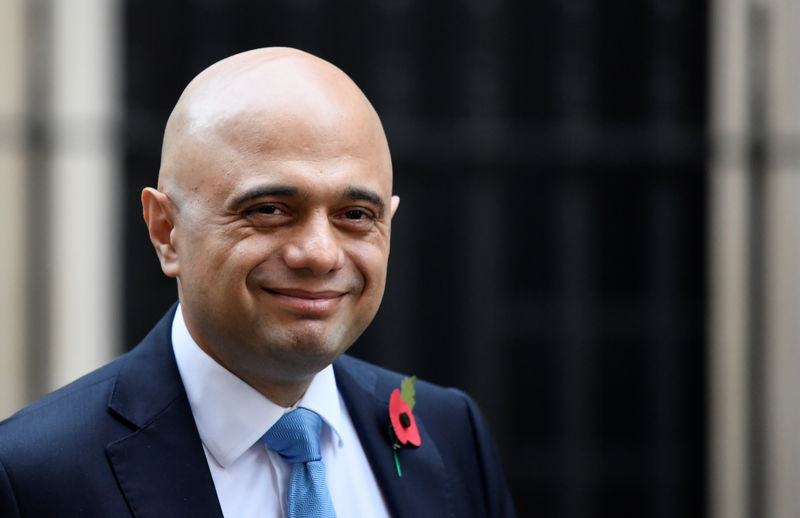By William James and Kylie MacLellan
LIVERPOOL/MANCHESTER, England (Reuters) - Two men are vying to be Britain's finance minister. One is a former banker who hangs a portrait of free-markets champion Margaret Thatcher on his office wall, the other is a proud socialist intent on overthrowing capitalism.
On Thursday, Conservative incumbent Sajid Javid and the Labour Party's would-be finance minister John McDonnell used speeches to argue that the Dec. 12 election is a critical moment for the world's fifth-largest economy, and that choosing their rival will set Britain on a path to fiscal ruin.
"This election isn’t just about the next 12 months of the Brexit withdrawal agreement, or even about the next five years. It’s about the next 10 years," said McDonnell.
"It’s about future generations, and the future of our country and, yes, the future of our planet."
But, set aside the ideological differences and for the first time in over a decade the Conservatives and Labour are fighting an election campaign with a similar promise: borrow, spend big, and pour billions into building roads, schools and hospitals.
Javid, a 49-year-old former Deutsche Bank (DE:DBKGn) financier, would rewrite the country's fiscal rules so he can spend an extra 20 billion pounds ($25 billion) per year, raising borrowing for infrastructure to 3% of economic output from its current 1.8%.
That willingness to spend reflects Prime Minister Boris Johnson's need to broaden his appeal with the electorate and reach those voters who typically vote Labour.
McDonnell, 68, is a lifelong campaigner who is promising to borrow and spend even more - 400 billion pounds ($500 billion) over 10 years. He says the fiscal rule should be that interest payments on government borrowing should not exceed 10% of tax revenues.
Their rules are different, but the direction of travel is the same, even if neither candidate wants to admit it.
"The difference between our approach and Labour's approach is like night and day, there is a huge gulf in difference in our economic approach," said Javid.
McDonnell said he wanted an "an irreversible shift in the balance of power and wealth in favor of working people".
RACE TO SPEND
The race to borrow and spend is a far cry from three previous election campaigns this decade, where the Conservatives played heavily on a reputation for fiscal prudence against a backdrop of economic uncertainty, forcing Labour to downplay its inherent willingness to loosen the purse strings.
The early pledges prompted one non-partisan think-tank, the Resolution Foundation, to declare that whoever wins, Britain appeared to be heading back to levels of state spending not seen since the 1970s, before Thatcher's small-state revolution.
"Both parties’ plans would represent a sharp change in policy, and Labour’s plans are especially ambitious," said Ben Zaranko, Research Economist at the Institute for Fiscal Studies think-tank.
The shift in the 2019 campaign reflects low borrowing costs, a budget deficit at its lowest share of GDP since the early 2000s, relatively stable economic fundamentals - setting aside the potential disruption of Brexit - and above all, voters' unwillingness to endure further spending cuts after nine years of austerity by Conservative-led governments.
There has also been a global shift, backed by the IMF, for higher spending.
While Brexit is expected to overshadow the state of the economy in the election debate, campaigning on basics like roads, railways, schools and hospitals is inevitable, and success depends on winning the economic argument.

On Thursday the new backdrop for those debates was set: borrowing and spending is set to rise, the question the voters will have to decide is by how much?